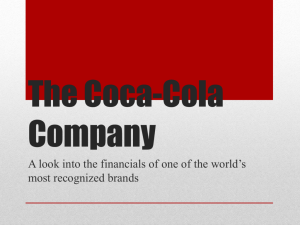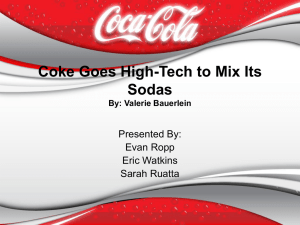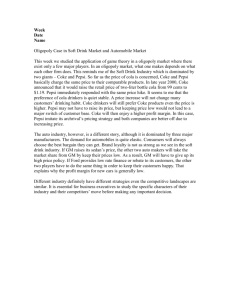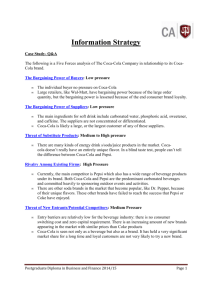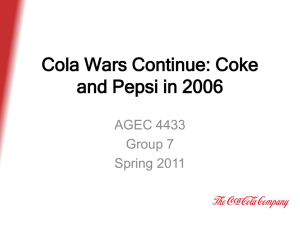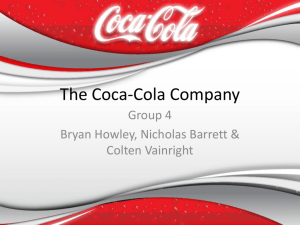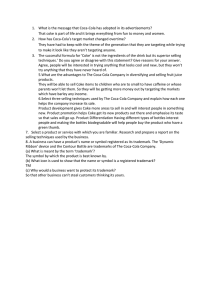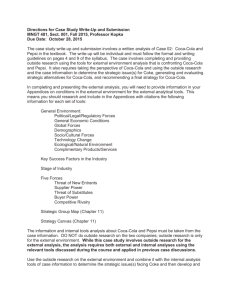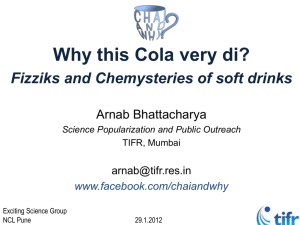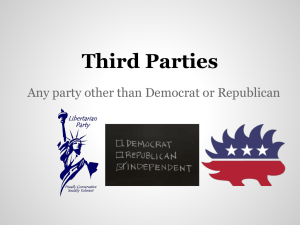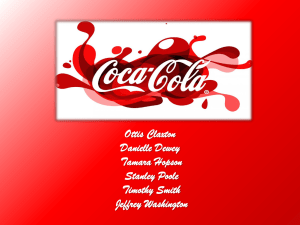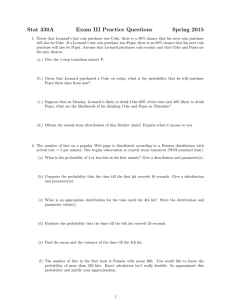Coca Cola's Competitors
advertisement
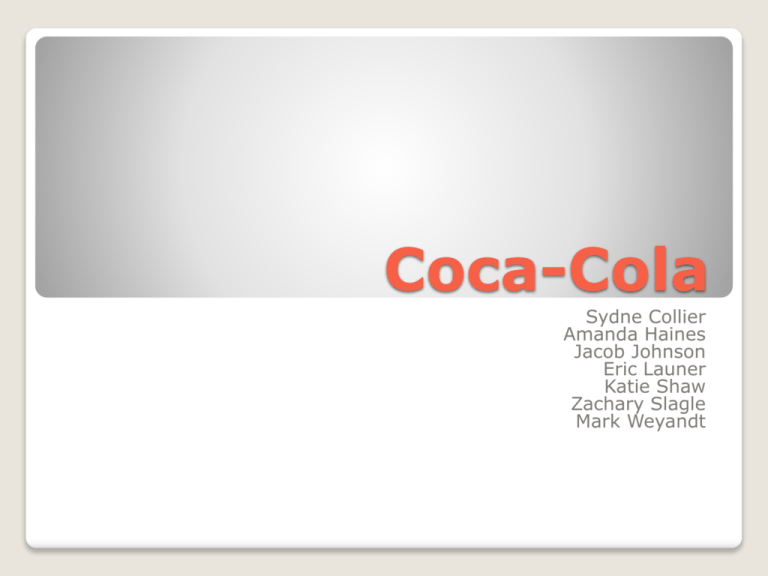
Coca-Cola Sydne Collier Amanda Haines Jacob Johnson Eric Launer Katie Shaw Zachary Slagle Mark Weyandt Brief History of Coca-Cola Company Business Operation Industry Analysis Company Capability Environmental Analysis Competitors Performance Indicators Introduction John Pemberton, created the syrup in 1886 Asa Candler took control of the Company in 1891 after the death of Pemberton 1916, the unique contour bottle was introduced. 125 years later, Coca-Cola Company has marketed over 400 brands and over 2600 different products in over 200 countries worldwide. History • Phase 1 – Initiation • Phase 2 – Formalization • Phase 3 – Expansion • Phase 4 – Coordination • Phase 5 - Participation Organizational Life Cycle Birth of Coca-Cola Shareholders Growth 1886-1905 Formulation Introduced Bottle New Places Stock Prices 1905-1923 Robert Woodruff WWII Great Depression 1923-1980 Diet Coke Sports 120 countries 1 billion servings per day 1980-Current Coca-Cola Organizational Chart Ease of Entry Growth within Industry Intensity of Competition Industry Analysis Substitute Products Bargaining Power Technology Innovation Industry Analysis (Cont.) Social responsibility ◦ Veterans Day celebration Organizational structure: decentralized Ability to attract and retain people Meeting competition Managerial Factors Customer loyalty and satisfaction Market share Investment in research and development Supplier strength Competitive Factors Access to capital Profitability Financial stability Financial Factors Level of technology used Production effectiveness ◦ Invest $30 billion in new equipment Newness of equipment and technology ◦ $100 contract with Dell Strength of patents Technical Factors Economic Factors ◦ Recession Political Factors ◦ Childhood Obesity and New York Social Factors ◦ 25 and under Environmental Scan Technological Factors ◦ PlantBottle Competitive Factors ◦ Pepsi Geographical Factors ◦ 200+ countries Environmental Scan Top selling soft drink company in the world Main competitors ◦ PepsiCo Company(Pepsi) ◦ The Dr. Pepper Snapple Group(Dr. Pepper) Coca Cola’s Competitors Total Revenue Net Income Total Employees Coke 47.6 Billion 8.8 Billion 146,200 Pepsi 65.70 Billion 5.92 Billion 297,000 Dr. Pepper 5.97 Billion 625 Million 19,000 Financial Comparisons Regular Cola ◦ Coke Leader Diet Cola ◦ Diet Coke Leader Lemon Lime ◦ Sprite Non caffeinated leader, Mountain Dew caffeinated Leader Orange Flavored ◦ Fanta Leader Root Beer - A&W Leader What they Compete On Coke is obviously the most successful soft drink out there Less people drink Soda Have to be innovative to continue to be leader Future Success Industry Leaders ◦ ◦ ◦ ◦ Coca Cola: 43% Pepsi Co: 31 % Cadbury Scweeps: 18 % Other: 8% Market Share Increasing trend in revenue 2011 fiscal year first quarter ◦ Increase in net income by 18% Annual divided yield ◦ High compared to other companies Sales Growth Strengths Weaknesses Leading brands Customer loyalty/relationships Management Production Quality ◦ Bottling process SWOT Analysis Weak Brands ◦ Odwalla Poor access to distribution Management Low customer retention Opportunities Changing customer tastes Technological advances Change in population age New distribution channels SWOT Analysis Threats Closing of geographic markets Technological advances Tax increases Change in population age New distribution channels Key Success Factors ◦ ◦ ◦ ◦ ◦ ◦ ◦ ◦ Quality/product performance Reputation/image Customer service capability Technological skills Manufacturing capability Marketing distribution Financial strength Relative cost position Competitive Strength Assessment Employees offering to sell trade secrets International problems related to unions Trouble with distributers Inflated earnings Racial discrimination Contamination scares Strategic Issues Corporate Giving ◦ ◦ ◦ ◦ Water stewardship Healthy and active lifestyles Community recycling Education Improving the Company
